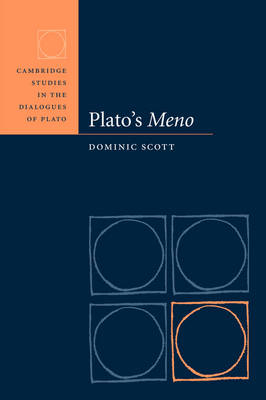
Plato's Meno
Cambridge University Press (Verlag)
978-0-521-64033-6 (ISBN)
Given its brevity, Plato's Meno covers an astonishingly wide array of topics: politics, education, virtue, definition, philosophical method, mathematics, the nature and acquisition of knowledge and immortality. Its treatment of these, though profound, is tantalisingly short, leaving the reader with many unresolved questions. This book confronts the dialogue's many enigmas and attempts to solve them in a way that is both lucid and sympathetic to Plato's philosophy. Reading the dialogue as a whole, it explains how different arguments are related to one another and how the interplay between characters is connected to the philosophical content of the work. In a new departure, this book's exploration focuses primarily on the content and coherence of the dialogue in its own right and not merely in the context of other dialogues, making it required reading for all students of Plato, be they from the world of classics or philosophy.
Dominic Scott is Senior Lecturer in Philosophy at the University of Cambridge and a Fellow of Clare College. His previous publications include Recollection and Experience: Plato's Theory of Learning and its Successors (Cambridge University Press, 1995).
Introduction; Part I: 1. The opening: 70a–71d; 2. The first definition: 71e–73c; 3. A lesson in definition: 73c–77d; 4. The third definition: 77b–79e; 5. Meno as interlocutor; Part II: 6. The stingray: 79e–80d; 7. 'Meno's paradox': 80d–81a; 8. The emergence of recollection: 81a–e; 9. The argument for recollection: 82b–85d; 10. The conclusion: 86b6–c2; Part III: 11. The method of hyposthesis: 86c–87c; 12. Virtue is teachable: 87c–89c; 13. Virtue is not teachable: 89e–96d; 14. Virtue as true belief: 96d–100b; 15. Irony in the Meno: the evidence of the Gorgias; 16. Meno's progress; Conclusion; Appendices; References; Indexes.
| Erscheint lt. Verlag | 16.2.2006 |
|---|---|
| Reihe/Serie | Cambridge Studies in the Dialogues of Plato |
| Verlagsort | Cambridge |
| Sprache | englisch |
| Maße | 160 x 235 mm |
| Gewicht | 543 g |
| Themenwelt | Geisteswissenschaften ► Philosophie ► Philosophie Altertum / Antike |
| ISBN-10 | 0-521-64033-4 / 0521640334 |
| ISBN-13 | 978-0-521-64033-6 / 9780521640336 |
| Zustand | Neuware |
| Haben Sie eine Frage zum Produkt? |
aus dem Bereich


